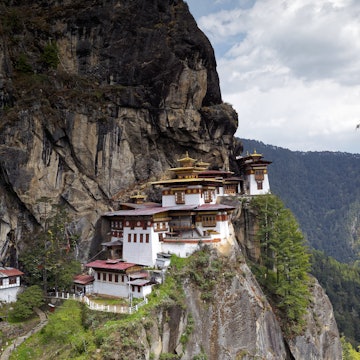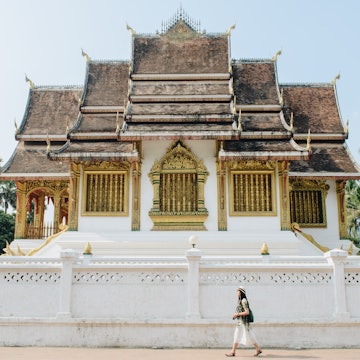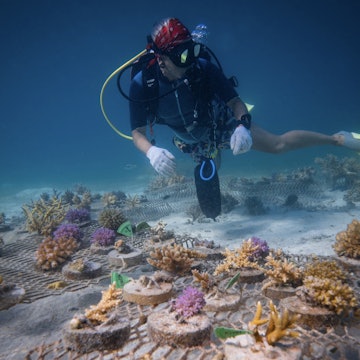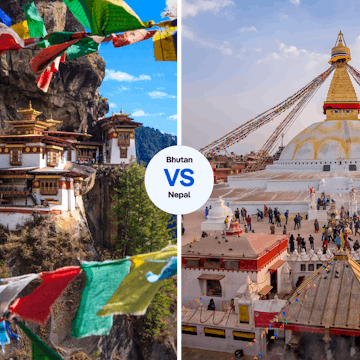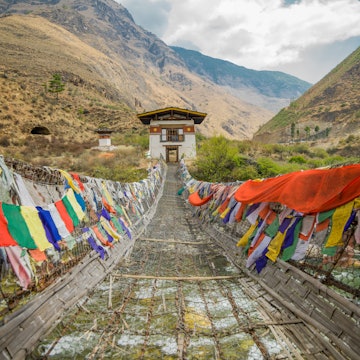

Have the ultimate family trip with this guide to travel with kids in Bhutan © Kateryna Mashkevych / Shutterstock
In the Himalayan Kingdom of Bhutan, a country that values happiness above everything else, children are welcomed with open arms.
Kept secret for decades, its isolation from the rest of the world has added to its mystery and allure. Now, Bhutan focuses on low-volume high-value tourism, and one of the best reasons to visit is to experience its unique customs and culture that remain largely unchanged. Traveling to Bhutan with children warrants stepping out of your comfort zone, but it's bound to be rewarding in unexpected ways.
Is Bhutan good for kids?
Scenic high mountain passes, fluttering kaleidoscopic prayer flags, forest covered slopes and air that's crisp and clean – the outdoors in Bhutan is invigorating and soul-stirring for the whole family.
Although having a local guide is no longer mandatory, this adds to the visit: having someone show you around their country and introduce you to their unique cultural nuances is a special experience. Your guide will be your go-to person, providing invaluable support, from where to stop for a bite to eat on long drives to helping you buy souvenirs.
With raw nature, ancient monasteries and welcoming locals, on paper Bhutan is the ideal canvas to build everlasting family memories. However, the high altitude can be troublesome and driving on sinuous roads is challenging for those prone to car sickness. Bhutan has outposts of some of the world's best luxury hotels around Paro and Thimphu, but in remote parts accommodation, restaurants and toilets tend to be basic.
While nappy changing stations, high chairs, kids' meals or play areas aren’t the norm, few rules have to be followed and nothing is frowned upon as far as children are concerned. Bhutan is a country that operates at its own pace and in its own way, and if you're looking for a family adventure, this might just be the perfect place to go.

Where in Bhutan is best for kids?
Arriving in Paro is nothing short of an adventure as only a handful of pilots are trained to swerve through the narrow valleys and land in the monastery-like airport adorned with frescoes and featuring the traditional Bhutanese carved and painted woodwork. Paro is Bhutan's second-largest city and, together with the capital Thimphu, is part of almost all itineraries. Both urban centers offer ample opportunities to sample Bhutanese traditions and culture, from museums and lively market squares to child-friendly activities.
Beyond these two big cities, Punakha in the western-central region – with its formidable Punakha Dzong, built on the confluence of the Mo Chhu and Po Chhu rivers – draws crowds through the year, particularly during religious festivals that take place in February or March. If your itinerary allows, explore Bhutan's outdoors and remote mountain villages – its real trump card – through treks and homestay experiences with your children.
Best things to do in Bhutan with babies and toddlers
Visit the colossal golden Buddha statue standing guard over Thimphu
What sets apart the gleaming, golden Dordenma from other large statues is that within the outer shell are ensconced 125,000 smaller statues. It sits atop a sprawling hall adorned with intricate frescoes used for meditation. Built to honor the 60th birthday of the fourth king, the temple complex is one of the most-visited sites in Bhutan. Small children will enjoy running up the stairs leading to the temple and the openness the large courtyard affords.
Gawk at the Himalayas from Dochu La
Take the windy road up from Thimphu to the 3100m (10,170ft) Dochu La for the best views of the Himalayas in the country. A sighting of the mighty snow-spattered Himalayas – the world's highest mountain range – never gets boring, but you are at the mercy of the weather gods. On a clear day lookout for Gangkar Puensum, the highest peak in Bhutan and the highest unclimbed mountain in the world. The Bhutanese believe mountains to be the abode of the gods and mythical creatures, and don't encourage climbing them.
After the taxing car ride up, toddlers will delight at having space to run around in the area near the viewpoint. To linger longer, strap on a baby carrier and take a short hike with your guide in the forest behind the chortens (stone Buddhist monuments).

Best things to do in Bhutan with school-age kids
Get a souvenir unlike any other at the Postal Museum
Personalized items are a real kid-pleaser and in Thimphu's Postal Museum, they can get stamps with their faces printed on them and use them to send out postcards. Take a look through the exhibits that highlight the country's postal history and browse through the collection of stamps released over the years marking significant events such as the Olympics and the King's coronation.
Try your hand at Bhutan's national sport
Stand upright, draw the bow and arrow, focus on the target and release: archery, Bhutan's national sport, is bound to draw out the competitive spirit in young warriors and is a great way to get a feel of the country's local customs and traditions (fun fact: archery is the only sport Bhutan has participated in at the Olympics).
Played in teams, archery events are also spectacles of colorful costumes and local dances. Hotels can organize an archery experience for you, or try it at the family-friendly Simply Bhutan museum in Thimphu.
Explore the formidable Punakha Dzong and walk across the Punakha Suspension Bridge
Of the many fortresses scattered across Bhutan, Punakha Dzong stuns with its location right at the confluence of two rivers. Gaze up at its towering whitewashed walls, impressive frescoes that narrate the story of the Buddha, and elaborate tapestries. It was here that all the kings of Bhutan have been crowned. In spring, framed by flowering jacaranda trees, it's one of Bhutan's most visually memorable sights.
A short distance away cross the icy-hued Po Chhu River via the longest suspension bridge in Bhutan. Adorned with hundreds of prayer flags and held by cables, children will squeal with excitement as a strong gust of wind rocks the bridge from side to side.
See how handmade paper is created
At the small Jungshi Handmade Paper Factory in Thimphu children and adults alike can marvel at how paper is made from the high-altitude daphne plant using a process that dates back centuries. Said to last over 1000 years, the paper is known to be naturally insect- and pest-repellent. Walk through the factory and learn about the process that remains largely unchanged. Before you leave, stock up on gifts at the cheerful onsite store that sells a variety of products made from handmade paper: tie-and-dye diaries and notebooks, wrapping paper embellished with dried flowers and leaves, lampshades and more.
Learn of your many past forms and your future at the College of Astrology
In an age where everything is instant and most answers come from a device, a visit to Pangri Zampa Lhakhang or the College of Astrology in Thimphu is like going back in time. Here in this 16th-century complex a resident monk consults ancient books and tells you about your past life, including the many forms you have taken. Don't be shocked to learn you were a pigeon in another life! From lucky days and colors to numbers, for children and adults it's fun having someone decode your life and future, whether you pay heed to it or not.

Best things to do in Bhutan with tweens and teenagers
Hike up Tiger's Nest
Shrouded in legend and lore, Taktsang Goemba, popularly known as Tiger's Nest, is one of Bhutan's most sacred and enchanting sites. Perched on a cliff face 900m (2952ft) above Paro valley, its location never fails to draw wonder and awe. Children of all ages will be fascinated by stories of Guru Rinpoche (also known as Padmasambhava or the “lotus-born”), who brought Buddhism to Bhutan, arriving on this spot astride a flying tigress before meditating here for days in the bitter cold without any food or water.
Getting to the serene monastery takes two to three hours of hiking up paths cutting through pine-covered forests, so this is not one for younger children. The air is thin and the climb itself arduous, but the monastery is an exhilarating reward and certainly one worth pushing through for. Midway up, the Taktsang Cafeteria, a cozy mountain-chalet-like restaurant, appears as a godsend. Take a much needed break and fuel up with hot beverages, snacks or a buffet lunch. The views of the monastery lit by the sun are some of the best.
Once on top see the impossibly small cave where the Guru meditated. In rooms bedecked with golden statues, colorful tapestries and prayer objects, watch monks, some as young as six, chant with senior monks.
Walk the ancient Bhutan Trail
There's no better way to teach kids about local culture and traditions than to immerse them in it. Walking a section of the newly opened 403km-long (250-mile) trail, which runs from Haa in the west to Trashigang in the east, allows you to traverse the country like the Bhutanese did before the advent of automobiles.
Pass through Bhutan's big cities, past remote mountain villages circled by paddy fields, walk through rhododendron forests, run across suspension bridges and stop to interact with Bhutanese people along the way.
On overnight treks, stay in homestays. These allow for meaningful interaction with local families: help out on their farms, learn to cook Bhutanese dishes or participate in festivals – there's no bigger learning experience than this!
Enthrall children with stories of garps (trail runners) who ran like the wind delivering important messages between dzongs (fortresses). In the past, these human messengers were the only way to communicate with the outside world.
Planning tips
You'll see school kids and Bhutanese people working with little children strapped onto their backs everywhere in the country, but outside of the bigger cities like Paro and Thimphu, you're unlikely to find diapers, formula, baby food and medicines, and it's best to carry sufficient supplies.
Swap strollers for baby carriers as sidewalks in larger cities tend to be narrow and can be at an incline. A trip through Bhutan involves a lot of long drives and moving from place to place. Speak to your guide in advance to ensure you can book a good vehicle and carry your car seat or booster if required.
Although kids’ menus are virtually nonexistent, you'll find sautéed vegetables, potato and cheese dishes and noodle dishes widely available. Bigger hotels and restaurants in more touristy hot spots also tend to feature Indian dishes, given the large number of Indian tourists that visit Bhutan.















